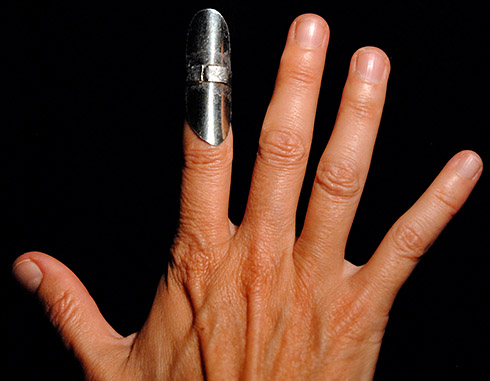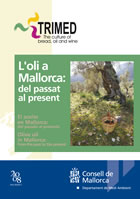Off to the mountains
La mort de na Margalida The Death of Margalida
En Bàlitx, tota la vida, Of Bàlitx, all life long,
en Bàlitx jo pensaré, of Bàlitx, I shall think,
allà on Deu vertader there where the true God
judicà Na Margalida" judged Margalida
(Popular Mallorcan song, by R. Ginard)
These are the opening lines of a popular song that recounts the death of Margalida, a young girl from Mallorca's plain who is hired to pick olives at Bàlitx rural estate in Sóller. Likewise it describes the desperation of her beau when he hears the news. Published in 1912 by Algaida-born Bartomeu Montserrat, known as mestre Tomeu Memes, it has been sung by Maria del Mar Bonet and Biel Oliver, known artistically as Biel Majoral.
Bàlitx is documented as having been an Islamic farmstead. It was divided latterly into three properties. The most important, Bàlitx d'Avall, featured a defensive tower, houses and an oil mill, as well as some 40 quarterades *[majorcan agricultural measure that equivales to 7103m]of olive trees. From the 16th century onward, olive-oil making was fundamental for rural estates in the Serra de Tramuntana. Despite this, the hard work involved in picking olives deterred the local population and workers had to be sought from towns and villages in the middle of the island, like Sant Joan, Sineu, Llubí, Petra, and Ariany. These female workers stayed on the estate from between three to six months (from early November through to Lent) and they only returned home for Christmas, when the harvesting was interrupted before being taken up again after Epiphany.
The work consisted of gathering ripe olives that had fallen from the trees. These were used to make oil. As well as a daily wage, the female olive pickers were given the necessary vegetables to eat and an agreed amount of oil. This was the main attraction of the job, since they could then sell it in their town or village or use it for family consumption. In about 1950, each olive picker was given 3 measures of oil per season (with 1 measure being equivalent to 16 litres).

During the olive-picking season, rural estates in the Serra de Tramuntana were bustling with people
Unlike summer harvests, the work of the olive pickers took place in adverse weather conditions, when it was cold, windy and perhaps rainy. As a result, sometimes they lit small bonfires to keep warm during the day. They also used to protect their fingers with cane or brass thimbles to avoid getting blisters. The forester kept an eye on the women as they came and went, and a veteran female worker, known as "la buidadora", poured the olives from baskets into sacks, which were then taken by donkey to the oil mill.
Since the girls that were hired were sometimes very young, their parents' minds were often more at ease if the group included an older woman from the same town or village. Sometimes, the girls' suitors also got hired by the same estate so that they could elude the supervision of the girls' families. As well as clothes and food (flour, pasta, sardines, cod, bacon and sobrassada), the girls took their castanets, dresses and jewels for the dance up there in the mountains or "per anar a muntanya", as the expression went, back then. They kneaded their own bread and made their meals. On Saturday afternoon they washed their clothes, and they put on their Sunday best to go to the nearest town, in more recent times to go to the cinema.
The parish priests of Mallorca's plain, who were sometimes instrumental in getting their parishioners hired, emphasized the perils of giving way to the pleasures of the flesh in their Sunday sermons. This is because the young girls stayed in houses set aside for them at the different rural estates, where they were a magnet for young men from neighbouring towns and villages, given the fact that they were young women or lasses living away from home. The women olive pickers were scornfully known as gallufes (foolish hens), among other things for their customs, like eating roasted hedgehogs or hedgehogs with rice; anything that differed from the eating habits of the people of the Serra de Tramuntana.
The cases de les dones (literally the "women's houses", where they lived) are described by architect Neus García Inyesta as fairly small houses, with a single or double sloping roof, and just a small stove to cook on and some bunk beds with mattresses stuffed with barley straw. Some examples of these buildings can still be seen, such as the one at Pastoritx rural estate (Valldemossa) or Planícia public estate (Banyalbufar).
Text by Elena Ortega
Translated by Rachel Waters
Did you know that...
The olive pickers celebrated the feast day of Saint Anthony with dances and by roasting food. The owner of the estate supplied them with wine, while his wife prepared fritters.
In Bunyola, a celebration called "la festa des Quarteró" has been revived. This took place at the end of the olive season, when the tenant farmers who ran the rural estates of Bunyola and Orient held a lunch for the olive pickers, with sardines, olives, and a quarteró of wine (equivalent to 16 litres).
Bibliography

L'oli d'oliva a Mallorca: del passat al present
Authors: Aina R. Serrano Espases i David Albert Vázquez
Published by: Consell de Mallorca, 2008
Els nostres arts i oficis d'antany
Autors: Llabrés, J.; Vallespir, J.
Published by: Estudis Monogràfics del Museu Arqueològic La Porciúncula, 1983
Cuentos, costumbres y escenas de nuestra payesía
Autor: Jaume, J.
Published by: Palma: Cort, 1978
Cases de Possessió
Autors: García Inyesta, N.; Oliver Sunyer, G.
Published by: Palma: Col·legi Oficial d'Arquitectes, 1986
Paraules i coses de fora vila
Autor: Segura, M.
Published by: Palma: Les Edicions de Bitzoc, 1996




